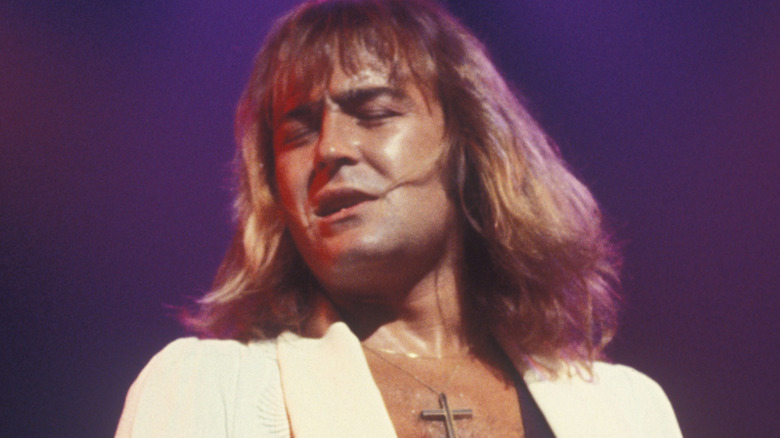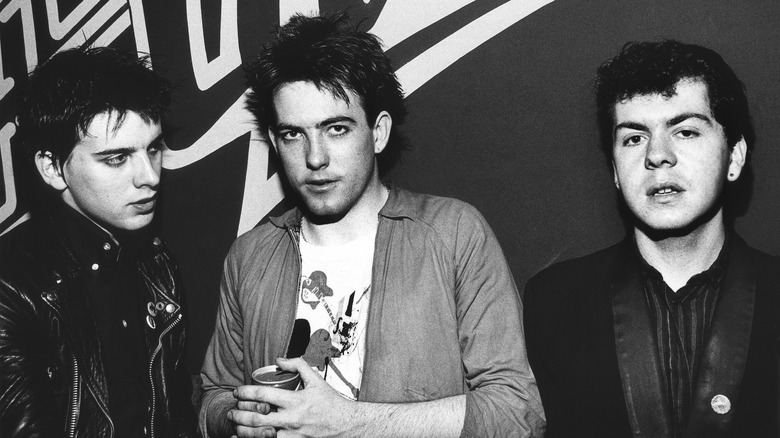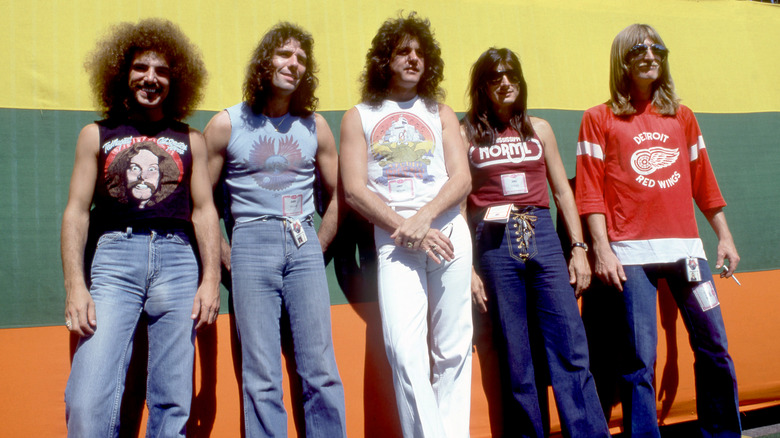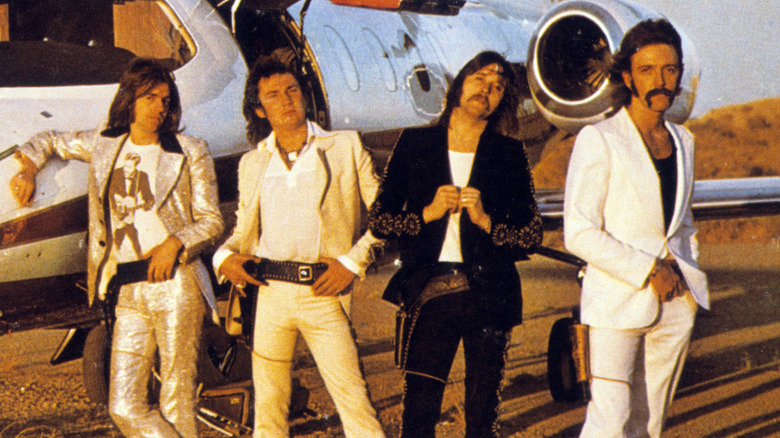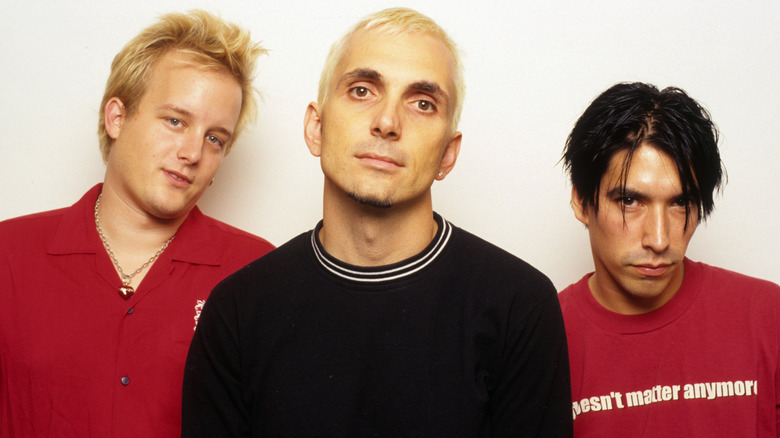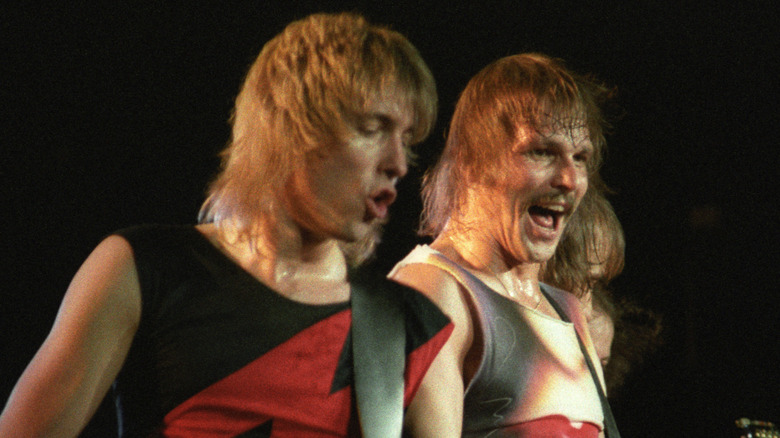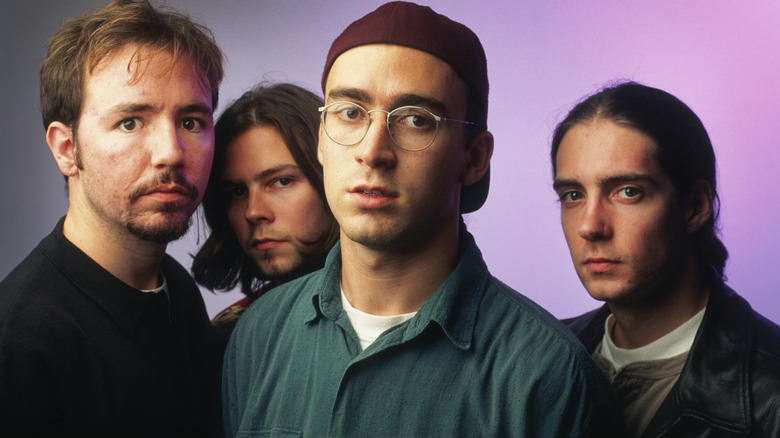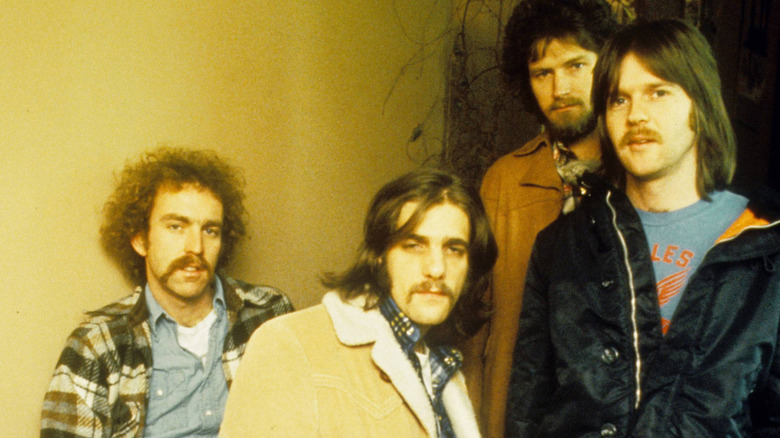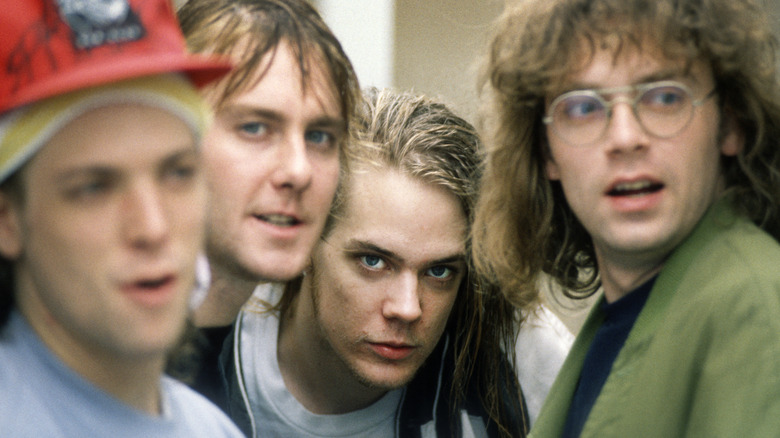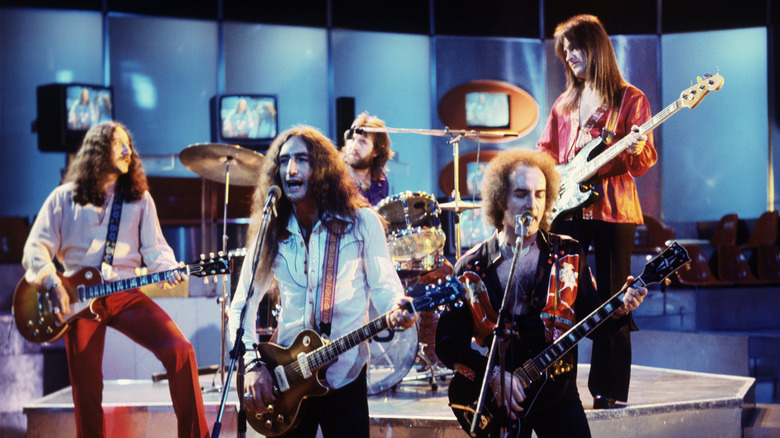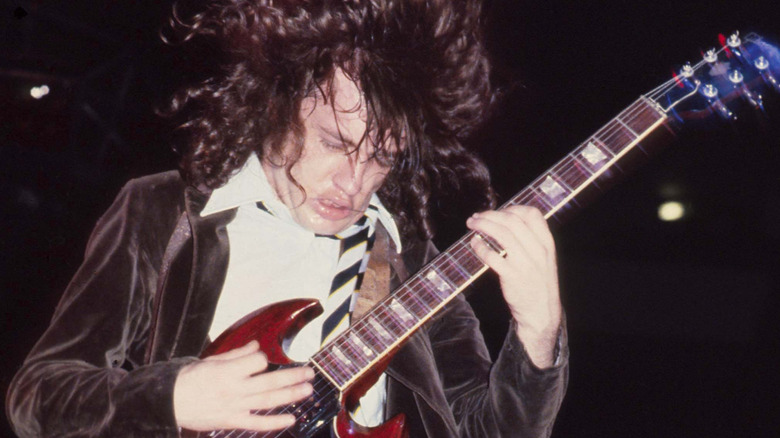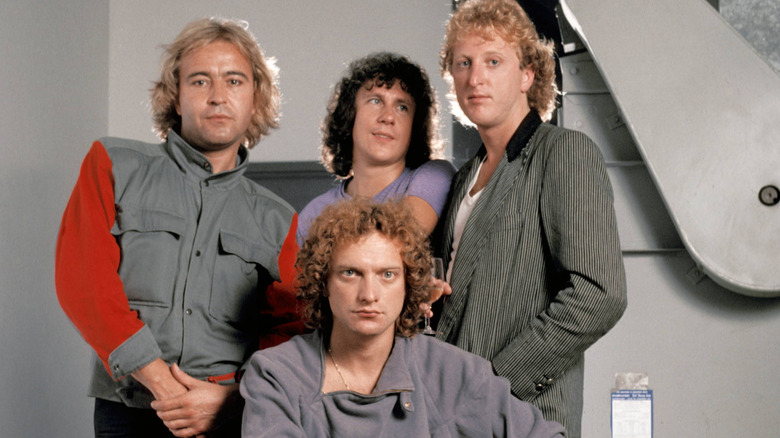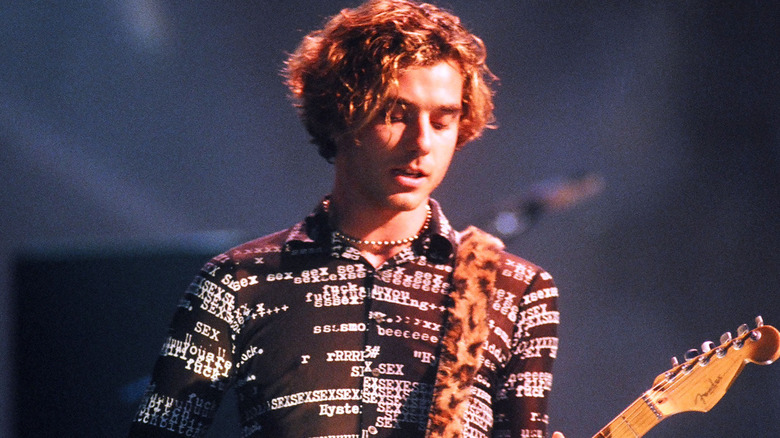Classic Bands With Only One Original Member Left
We may receive a commission on purchases made from links.
With three, four, or even more people involved, a rock band is a tricky environment to navigate. Multiple opinions can lead to band tension over creative matters and, if the group finds international and monumental success, business affairs, legacy, and many other complicated subjects. It's remarkable that a big band can stay together for any period of time at all, but a few manage to survive and thrive for decades. The key to making it last seems to be evolution — very few bands stick around forever, but those that do invite lineup changes. Whether it's due to death, willing departure, or termination via a power-mad lead singer or main songwriter, band lineups change, and there's not much to be done about it, even if those exits keep happening.
Here are some well-entrenched and once-dominant bands from the '60s, '70s, '80s, and '90s who are still intact after all these years, but perhaps only arguably so, as they're still touring and even recording with only one member remaining from their earliest days or peak era.
The Cure
Before it would become a definitive act of the 1980s, the Cure, a goth rock band with a layered, lush, and moody keyboard-driven sound, began life in the mid-1970s as a tight, sharp, and crisp post-punk outfit originally called Malice and then the Easy Cure. Robert Smith took lead vocals and guitar, recruiting friends from school Michael Dempsey and Lol Tolhurst to play bass and drums, respectively, and bringing on established guitarist Porl Thompson. By 1978, the Easy Cure had changed its name to simply the Cure. The group lost Thompson by the time it signed to Fiction Records and began recording its first album, "Three Imaginary Boys."
Dempsey subsequently departed just after the release of the record, and Smith brought in new members Simon Gallup and Matthieu Hartley to record "Seventeen Seconds," the Cure's first stab at darker territory. New members (and Thompson) would cycle in and out over the years, and Tolhurst moved from the drums to the keyboards. In one tragic detail about the Cure, Tolhurst left in 1989 when his substance abuse overtook his ability to contribute. Tolhurst would find sobriety and return to the Cure for some guest appearances, but his official departure meant that Smith was the only original member of the band.
Journey
Before it was Journey, which sold millions of records but never had a No. 1 hit, it was the Golden Gate Rhythm Section, populated by former Santana members Neal Schon and Gregg Rolie, who played guitar and keyboards. They brought in bassist Ross Valory and guitarist George Tickner of Frumious Bandersnatch, along with drummer Prairie Prince of the Tubes. Initially a backup band for hire, the group renamed itself Journey, replaced Prince with Aynsley Dunbar, and became a jazz-progressive rock fusion outfit. By the early 1980s, the lineup had solidified with the addition of powerhouse vocalist Steve Perry and new keyboard player Jonathan Cain who helped Journey become a bestselling pop-rock band responsible for fist-pumping anthems like "Don't Stop Believin'" and "Separate Ways" and power ballads such as "Faithfully" and "Open Arms."
Steve Perry left Journey in 1987, and the band didn't reconvene until the mid-'90s, although Perry's involvement wouldn't last beyond the 1996 album "Trial by Fire" because a hip injury prevented him from touring. By 2007, the group's longest-serving members were Schon, Cain, and Valory, and the former two fired the latter in 2020 for allegedly trying to acquire the rights to the Journey name. This makes Schon the last musician from the first permutation of Journey.
Foghat
Foghat got started in 1970 by former members of Savoy Brown: Singer "Lonesome" Dave Peverett, drummer Roger Earl, and bassist Tony Stevens joined up with guitarist Rod Price. A major act of the arena rock era, British blues-and-hard-rock band Foghat didn't generate all that many hits, but nearly all of them became foundational to classic rock radio. Among the band's contributions: "Slow Ride," "Fool for the City," "Stone Blue," and a cover of the standard "I Just Want to Make Love to You."
The band attempted to weather Price's exit in 1981 but split up after recording the 1983 flop "Zig-Zag Walk" with new guitarist Erik Cartwright; it didn't help that Peverett didn't want to perform anymore. Foghat's first lineup reunited for a couple of albums and some tours in the 1990s, but that era would end with the cancer-related death of 56-year-old Peverett in 2000. The band moved on with new singer Charlie Huhn until 2005 when 57-year-old Price died and Stevens quit. Foghat remains a touring act, and in 2023 came out with its 17th studio album, "Sonic Mojo." The only guy from the early 1970s still with the band: drummer Roger Earl.
Everclear
After a series of personal tragedies and musical projects that didn't go very far in the 1980s, singer-songwriter-guitarist Art Alexakis moved to Portland, met bassist Craig Montoya and drummer Scott Cuthbert, and recorded a rough, independently released 1993 LP called "World of Noise." Before recording and releasing album number two, the major-label "Sparkle and Fade," which included huge alternative rock radio hits "Heroin Girl" and "Santa Monica," Alexakis had cut Cuthbert and brought in Greg Eklund.
As that trio, Everclear continued to churn out catchy rock hits for the remainder of the 1990s and beyond. In 2003, both Montoya and Eklund departed the band, tiring of the band dynamic — Alexakis allegedly treated Everclear as a personal musical outlet and made most of its creative decisions. "Everclear is Everclear. It was always Art's band. His songs. You would have to ask the guys who play with him now whether or not [they] are in the band or 'hired guns,'" Eklund wrote in a Reddit AMA in 2018. "I know a lot of the guys who have played in the band after Craig and I left. Eventually they all leave for the same reasons as Craig and I did."
Scorpions
The German hard rock band best known for definitively 1980s hits like "No One Like You" and "Rock You Like a Hurricane" had been around for a long time before it ever caught on outside of its home nation. Scorpions first came together back in 1965 as a trio, with guitarist and lead vocalist Rudolf Schenker, bassist Lothar Heimberg, and drummer Wolfgang Dziony. By the time it released its 1982 commercial breakthrough album "Blackout," Heimberg and Dziony had long since departed but new members had arrived: lead singer Klaus Meine, bassist Francis Buchholz, drummer Herman Rarebell, and guitarist Matthias Jabs. Schenker decided to focus on guitar while also serving as the band's leader.
By the 2020s, Meine and Jabs were still with Scorpions and boasting 40-year-plus tenures. But neither had played with the group for as long as original member Schenker, still heading up Scorpions after 60 years.
Live
In 1984, four Pennsylvania teenagers formed Live. The band's cryptic, agitated, and emotional alternative rock captured a feeling in the mid-1990s, as hit singles like "I Alone," "Selling the Drama," "Lightning Crashes," and "All Over You" were all over radio. Their albums sold less and less in the 2000s, and frontman Ed Kowalczyk attempted to take over all creative decisions in the band. He called for a split over email in 2009. "We all responded in about 30 seconds and went, 'Great idea,'" guitarist Chad Taylor told Rolling Stone.
Tensions eased enough for a 2016 reunion tour, with Kowalczyk and Taylor quietly negotiating with promoters to receive 40% and 30% revenue shares, respectively; bassist Patrick Dahlheimer and drummer Chad Gracey got 15% each. Live stayed on the road until the pandemic forced them to stop in 2020. In 2022, Kowalczyk declared that he'd acquired a controlling interest in Live and had fired Taylor — apparently a move meant to punish Taylor for bringing his business partner, Bill Hynes, into the band's orbit. It was discovered that Hynes had allegedly swindled the members of Live out of $10 million. Then Kowalczyk fired Dahlheimer and Gracey and revived Live with backing musicians to tour casinos, festivals, and amusement parks.
Eagles
Objectively one of the most popular American bands of all time — its first greatest hits album and studio LP "Hotel California" are the No. 1 and No. 4 best-selling albums ever — Eagles ushered in the smooth, West Coast country rock that would help define the 1970s. The whole project began as the backing band for Linda Ronstadt. From the LA scene, the singer hand-picked drummer Don Henley and guitarist Glenn Frey, who hit it off so well musically that they endeavored to form their own band. Ronstadt recommended they hire second guitarist Bernie Leadon, and her producer, John Boylan, thought Randy Meisner would be a good fit on bass guitar.
Long-time member Don Felder joined in 1974, while Joe Walsh arrived in 1975 to replace Bernie Leadon, with whom tensions had escalated to the point that he left the group not long after he poured a beer on Frey during a band meeting. Timothy B. Schmit came onboard in the late '70s after Meisner was out due to medical problems and creative differences with other Eagles. The band then went on a hiatus that seemed permanent until its 1994 "Hell Freezes Over" reunion album surfaced. Frey participated in every 2000s Eagles project until his death in 2016. In the 2020s, the band includes former country superstar Vince Gill, Schmit, Walsh, and sole original member, Henley.
Soul Asylum
The Minneapolis indie rock scene of the early 1980s produced some legendary acts, including the Replacements, Hüsker Dü, and Soul Asylum. The first two quickly gained national recognition; it would take Soul Asylum more than a decade after its founding to find mainstream fame. The 1992 album "Grave Dancers Union" landed the group a No. 1 alternative rock hit in "Somebody to Shove"; the 1993 single and video for "Runaway Train" made Soul Asylum one of the best-known rock bands on the planet. Hits like "Without a Trace," "Misery," and "Just Like Anyone" followed.
The first Soul Asylum lineup to record included Dave Pirner (guitar and vocals), Dan Murphy (guitar), Karl Mueller (bass), and Pat Morley (drums). Grant Young replaced Morley after a couple releases, and he'd be the first long-tenured Soul Asylum member to leave; he couldn't get the rhythms right during the "Grave Dancers Union" sessions, and his substitute, Sterling Campbell, replaced him full-time around 1994. Campbell left four years later, while Mueller died from complications of cancer in 2005. Murphy quit in 2012. "To survive in the game of music in this current incarnation," he announced on Soul Asylum's website, "it occurs to me that one needs an unhealthy and combustive internal combination of two seemingly distant attributes — naivety and swagger. I no longer have either." Pirner continues to tour and record under the Soul Asylum name, albeit with new musicians backing him up.
Uriah Heep
Uriah Heep dabbled in both progressive rock and heavy metal in those genres' infancies, and the British group created early 1970s favorites like "Come Away Melinda," "Wake Up (Set Your Sights)," "Easy Livin,'" and "Sweet Lorraine." After trying out a slightly different lineup in 1969 under the name Spice, the next year the group changed its name to Uriah Heep after a character in Charles Dickens' "David Copperfield." Included initially were vocalist David Byron, guitarist Mick Box, bassist Paul Newton, drummer Alex Napier, and keyboardist Ken Hensley.
Dozens of musicians have since played with Uriah Heep on its more than 40 albums, but of the original musicians who took up that moniker, only Box is left. Napier played on the band's debut album, "Very 'Eavy... Very 'Umble," and bolted (he died in 2023), and Newton departed in 1971 after three LPs. Byron got fired in 1976 because his excessive drinking made him so unreliable; he took the stage while drunk at one show and fell into the orchestra pit. (He died from alcohol-related health issues in 1985.) Hensley left in 1980; he died in 2020.
AC/DC
AC/DC came together in 1973, formed by Australian guitarist brothers Malcolm and Angus Young. Things rounded out with the addition of drummer Phil Rudd, bassist Mark Evans, and lead singer Dave Evans, who, after not wanting to perform an early gig, was replaced by the band's driver, Bon Scott, a vocalist who'd been in a few regionally popular progressive rock bands. With Mark Evans fired in 1977 in favor of Cliff Williams, this permutation of AC/DC broke out commercially around the world with the multi-platinum "Highway to Hell."
The future of the band was left in doubt after the alcohol poisoning-related tragic death of Bon Scott in February 1980. With new singer Brian Johnson, AC/DC recorded "Back in Black," which would go on to move 27 million copies in the U.S. alone, one of the best-selling albums of all time. Creative tensions with Malcolm Young led to Rudd's departure in 1983, although he'd return in 1994. He left the band again in 2015 due to legal issues related to drug possession charges and allegedly attempting to arrange a murder. Malcolm Young died in 2017 following a dementia diagnosis, making Angus Young the last original AC/DC musician still in the group. As of 2024, the band includes Young, his nephew Stevie, Johnson, and later additions Chris Chaney and Matt Laug.
Foreigner
Part of the untold truth of Foreigner is that it got its name because British musicians Ian McDonald and Mick Jones created the band in 1976 in New York with American singer Lou Gramm. About a year later, the band became one of the biggest rock outfits on the planet, with its self-titled debut selling 5 million copies and leading to its first big hits such as "Cold as Ice" and "Feels Like the First Time." After filling arenas in the late 1970s, Foreigner went pop in the '80s with the power ballads "Waiting for a Girl Like You" and "I Want to Know What Love Is." Gramm quit Foreigner in 1990 for a moderately successful solo career. He returned in 1994 to write and record with Jones again, but he resigned once more in 2003.
Since about that time, Kelly Hansen has served as the main singer in Foreigner, alongside bassist Jeff Pilson, who joined in 2004, and an assortment of side musicians. As of the 2020s, Jones was still officially a member of the group who would head out onstage for a few songs with the band when his health allowed. In 2024, he announced that he had Parkinson's disease and would participate in the band's final tour in some way.
Bush
The tragic real-life story of Nirvana ended with the 1994 death of Kurt Cobain, and the British band Bush arrived to fill a musical void. Over the next few years, Bush dominated alternative rock radio and MTV with Nirvana-esque growlers like "Everything Zen," "Little Things," "Glycerine," "Swallowed," and "Greedy Fly." With great success came changes in the Bush lineup, which had been the same since it formed in 1992. After attempting to leave in 2001 to be with his wife during a medically difficult pregnancy, founding guitarist Nigel Pulsford was fired via an email from frontman Gavin Rossdale in 2002. "He said the whole band felt the same way," Pulsford told Undercover (via Blabbermouth). Bush broke up later that year, only to reunite incompletely in 2010 — Pulsford and bassist Dave Parsons declined to participate. "It's not something he wanted to do — he has a family," Rossdale told Spin of Pulsford. As for Parsons: "He thought about it for the weekend and then said he couldn't," according to Rossdale.
Bush's old drummer Robin Goodridge came back and stayed in the fold until 2019, when he says Rossdale fired him with no real cause. He later sued over unpaid concert tour profits. As of 2022 and the recording of the album "The Art of Survival," Rossdale is the only early member of Bush still in the group.
If you or anyone you know needs help with addiction issues, help is available. Visit the Substance Abuse and Mental Health Services Administration website or contact SAMHSA's National Helpline at 1-800-662-HELP (4357).
